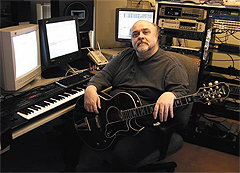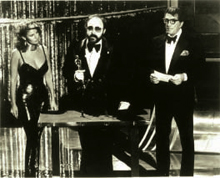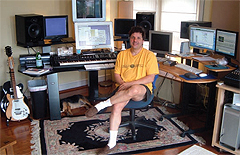Music, Sound, and Audio Technology
| Music and Your Movie By Leonard Guercio posted Mar 28, 2008, 13:41 |
Click here to get a copy of the July 2006 Edition, so you can read and enjoy all of the excellent articles inside. Check out this article in the July 2006 print edition of StudentFilmmakers magazine, page 24.

Leonard Guercio is an independent filmmaker and an adjunct film professor at Temple University in Philadelphia.
Finding the Right Musical Cues
 Even for experienced filmmakers, putting music in a movie is an
unpredictable and complicated process that can mean success or
failure for a film. Generally speaking, finding the right musical cues
for your movie is essentially about making choices. If you’re
attuned to your gut instincts, making the right aesthetic, narrative
and technical decisions should naturally come out of the
controlling idea that guides your path through the forest of creative
options.
Even for experienced filmmakers, putting music in a movie is an
unpredictable and complicated process that can mean success or
failure for a film. Generally speaking, finding the right musical cues
for your movie is essentially about making choices. If you’re
attuned to your gut instincts, making the right aesthetic, narrative
and technical decisions should naturally come out of the
controlling idea that guides your path through the forest of creative
options.
Think about your favorite movies and their film scores; in the most compelling ones, the music is often inseparable from (or married to) the images in a way that makes the whole experience greater than the sum of its parts. “When it’s that good, you know; the scene becomes three dimensional,” says Joe Renzetti, Academy-Award winning film composer of The Buddy Holly Story. So how do we go about finding the best music for the stories we want to tell? Starting with the basic building blocks of a movie – the shot, the scene and the sequence – is a good place to begin. “What is the emotional content of this scene?” asks Renzetti. By extension, the other important question to consider is: What do you want the audience to feel, to know? After all, the purpose of putting music to your moving images is to help create a memorable emotional effect on the audience.
GETTING STARTED
Depending on a film’s budget and the director’s intentions, the music selection process may involve either obtaining the rights to use previously recorded songs and/or creating original music specifically for your movie. If your film has a good-sized budget, you’d be wise to hire a music supervisor to help obtain licensing for any pre-recorded music you may want to use. In many cases, there are no set fees for what artists and copyright owners will want to charge for their music. A popular song can be prohibitively expensive to license as a music cue in a film; or, you may be surprised at how relatively inexpensive a song might cost. Online resources like www.bmi.com/licensing or www.ascap.com/ace are good sites to start your research.
A TEMPORARY SOLUTION
Inserting pre-recorded music that has the right feeling for the story you intend to communicate is usually a helpful approach for filmmakers when editing picture. During the rough cut and successive fine cut stages of constructing your film story, temp tracks can be very useful in establishing your movie’s rhythm, tension and emotional direction.
“If you’re cutting a film, you want to have some music,” says Renzetti. And, if you’re planning to show a cut of your movie to investors, he adds, “you want to have it look and sound like a film.” Renzetti believes that temp tracks can be “a lesson to the aspiring film composer to listen to that and say, oh, I understand what you mean [to communicate].” But temp tracks are called just that because they serve a temporary purpose. In order to legally use most pre-recorded temp cues, you have to pay to license them, and, if you’re on a low budget, the fees for one popular song could very well exceed your film’s entire budget.
BEWARE OF DEMO LOVE
Unfortunately for some filmmakers, after seeing the picture so many times married to the temp music tracks, they fall victim of the syndrome known as demo love. This condition is characterized by a deep dissatisfaction with any other music chosen to replace the temp cues. Sadly, demo love can prove fatal to the festival and theatrical life of a movie. John Avarese, a film composer and adjunct professor of Film & Video at Drexel University in Philadelphia, says that, even though temp tracks may help the filmmaker and composer to approximate the right emotional tone and pace, he doesn’t “encourage using a temp score unless the director can let go of it.”
OTHER OPTIONS
So, if you cannot afford to pay license fees for sync and master
use rights of the music you want to use, you’ve no choice but to
remove the unlicensed music after picture lock and replace it with
music you do have the rights to use. You can choose to use royaltyfree
library music, but finding the right cues can be extremely timeconsuming
and disappointing. Canned music – as library music is
sometimes called – can sometimes have a stale, artificial flavor
 unsuited for a fresh film story.
unsuited for a fresh film story.
One of the least expensive ways to create music for your movie is to use popular loop-based music creation programs like Apple’s GarageBand or SoundTrack, Avid and M-Audio’s Session and other similar products. The trade-off here is that you have to spend the requisite time to create all the musical cues you need for your film. If you’re not musically inclined, this could also be very timeconsuming and may quickly drain your creative energy. In such a situation, it makes sense to turn to people who have the training, interest and passion to create original music.
An expedient way to obtain original music for your movie is to seek out your musician friends. If they have a great band and make the kind of music you feel best represents what you want to communicate in your movie, then by all means make a deal with them. Perhaps you can even afford to give them a small cash honorarium as a token of thanks. They would get musical exposure through your movie and you’d get low-cost music from artists you like.
Finally, the option many cash-strapped student and independent filmmakers rarely consider is to hire a professional film composer. As in licensing music, our first impulse is to think that the cost for hiring a pro composer is beyond budgetary possibilities. However, as the old saying goes, it never hurts to ask – you just might be pleasantly surprised.
IT’S NOT ALWAYS ABOUT THE MONEY
Both Renzetti and Avarese believe that there are many film composers out there, including themselves, who are eager to work on a fresh, interesting and unique student or independent movie project. And, surprisingly, payment is often not their first consideration. “Personality is a big factor,” claims Renzetti when deciding whether to score a film. “First of all, I’d like to see the product. Let me see what you’re doing… If it’s a film of some substance or merit, I would work something out.” For John Avarese, his take on getting paid is somewhat similar. “Money is never an issue because I know they (student and independent filmmakers) usually don’t have any. Pay me what you can.” When considering a project, the main criterion Avarese asks is that the “film has to be almost done. Show me a rough cut then I make the decision.”
IT’S ABOUT BUILDING RELATIONSHIPS
Filmmaking is a communal effort that works best when the
project is foremost in everyone’s efforts. Good film composers are
keen to align themselves with talented, serious filmmakers. When
working on a movie project,  Avarese says he seeks out creative,
dedicated filmmakers because “hopefully, that director is going to
the next place. Then it’s like, take me with you, because composer
and director relationships last a long time.”
Avarese says he seeks out creative,
dedicated filmmakers because “hopefully, that director is going to
the next place. Then it’s like, take me with you, because composer
and director relationships last a long time.”
Renzetti looks for directors who are open to the contributions that a film composer brings to a movie. “It’s about the betterment of the project,” he says. “Sometimes a film composer will hit upon some idea that they never thought of and here’s a whole new discovery that would be fabulous.” It’s important, as it is with hiring other key production team members, that a filmmaker has trust in the composer’s skills, creativity and experience. Discovering new ideas through music is one of the many inspiring gifts that good composers bring to a movie project.
EVERYONE WAS A NOVICE ONCE
Film composers, even experienced ones like Renzetti and Avarese, had to start somewhere. According to Renzetti, “The Buddy Holly Story (1978) was an independent film. It’s just that that word wasn’t known in those days …[that film] was selffinanced out of Texas and we pretty much made it on a shoestring budget and Columbia picked it up.” Renzetti went on to score such films as Fatso, Poltergeist 3 and Child’s Play, the first Chuckie the doll horror film. With two films soon to be released, Renzetti continues to look for new films to score. To find out more about Joe Renzetti and to hear samples of his work, go to http://www.joerenzetti.net
John Avarese has written music for many short student films, six independent features, TV commercials and corporate video presentations. He worked as a keyboardist in a traveling band and came to picture scoring in the late 1980’s when a desperate friend asked him to write music for a corporate video overnight. He’s been on a prolific roll ever since, with over 3,000 scores to his credit. For more information about John Avarese and to hear his music, check out http://www.johnavarese.com
This article may not be reprinted in print or internet publications without express permission of StudentFilmmakers.com.
| Don't miss another important edition of StudentFilmmakers magazine which focuses on cutting-edge, pre-production, production, post production, and distribution technologies and techniques. Six-month, 1-year, 2-year, and 3-year subscriptions available with discounts from the cover price. Back Issues are also available while copies last. Go to www.studentfilmmakers.com/store >> |
StudentFilmmakers magazine, the #1 Educational Resource for Film and Video Makers, publishes 12 editions per year. Subscribe today and get this important magazine delivered right to your doorstep every month. Each edition contains high level, educational articles for serious filmmakers and videographers like you - articles including cutting edge, real-world practices, trends, and technology, as well as in-depth inspiring interviews with independent filmmakers and experts.
There is something for everyone in each issue, whether you are a director, cinematographer, camera operator, gaffer, editor, producer, sound engineer, animator, composer, actor, screenwriter, ... With today's technology changes coming faster and faster, we are all students.
StudentFilmmakers magazine would like to hear from you!
Click here to share your comments and feedback about the magazine, monthly editions, your favorite articles, and your favorite topics.
We always welcome and appreciate your Reader Comments. View them here, and send yours to the editors today!